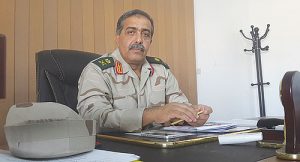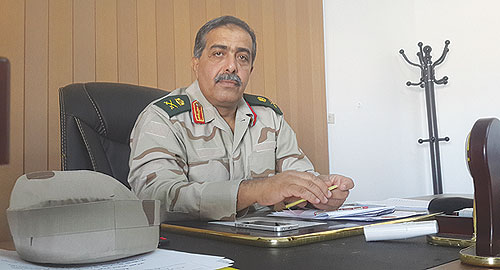By Sami Zaptia.

London, 26 July 2016:
The House of Representatives’ (HoR) Libyan National Army Chief of Staff, Abdelrazak Nazhuri, warned that any foreign oil tankers approaching the Libyan coast will be targeted by the air force.
Nazhuri, who has also been appointed military ruler in the east, said that only oil tankers that had been sanctioned by the eastern-based National Oil Corporation (NOC) recognized by the HoR would be allowed to enter Libyan waters.
Nazhuri’s statement seems to have put an end to the reunification of the Tripoli and Benghazi NOC reached in July this year. His threat has come on the back of the meeting by UNSMIL chief Martin Kobler with regional strongman and Petroleum Facilities Guard head Ibrahim Jadhran in the eastern port of Ras Lanuf last week. Kobler was hoping to persuade Jadhran to reopen the eastern oil ports of Ras Lanuf, Sidra and Zuetina.
Jadhran has been blockading the export of oil from the local coastal oil port terminals under his control since the time of Prime Minister Ali Zeidan back in August 2013. As a result, Libyan oil production has plummeted from a post Qaddafi high of 1.5 million in 2013 to anything ranging from 200,000 to 400,000 bpd in the intervening years.
The Kobler-Jadhran meeting has, however, invoked a negative reaction from the tribes controlling the actual inland oilfields and regions which the pipelines pass through on their way to the coastal ports and oil terminals.
The tribes said that Kobler must speak directly to them and reach a separate agreement with them if he wished to have oil production resumed at the source. They also insisted that they only recognize the HoR and its Abduallah Thinni government in Beida. Jadhran, on the other hand, now claims to recognize the only internationally recognized government of Faiez Serraj and his PC/GNA in Tripoli.
To further complicate matters, Mustafa Sanalla, the chairman of the Tripoli-based and PC/GNA recognized NOC, has slammed Kobler for meeting Jadhran.
In a leaked letter to Kobler, a copy of which was seen by Libya Herald, Sanalla criticized the UNSMIL chief for giving implicit recognition to Jadhran who Sanalla labelled a ‘‘criminal’’. Sanalla objected to Jadhran being rewarded having cost the Libyan state ‘‘over $ 100 billion in lost (oil) revenues’’ in nearly three years.
Jadhran has been extorting the Libyan state at gun point by refusing to open up the oil ports in his region and Sanalla felt the hundreds of millions the PC/GNA was reportedly going to pay Jadhran could be better spent on other oilfields and facilities to increase production – not under Jadhran’s control. Sanalla also threatened to withdraw his recognition of the PC/GNA.
Jadhran hit back at Sanalla’s criticism and promised to reopen the oil ports under his control within days if the PC/GNA signed an agreement with him. It is believed he is awaiting a pay-off
If carried out, Nazhuri’s threat to fire on oil tankers approaching Libyan ports without the HoR’s permission would seem be a further blow to the international community and the PC/GNA’s plans to increase Libya’s oil production. It could also be a blow to the whole existence of the hitherto ineffective UN-backed PC/GNA.
Libya is teetering on the brink with power cuts, a cash crisis, high crime and insecurity, a budget deficit and fast depleting foreign currency reserves. A boost in state revenues through increased oil production could facilitate some relief. But it seems increased oil production is intricately linked to the existing complex political conflict and the one cannot be solved without solving the other.
At the heart of the differences are the refusal of the HoR to recognize the Serraj GNA. The HoR dislikes the non-consensual nature of the PC and that is why the PC’s eastern representative Ali Gatrani has boycotted the PC.
The HoR objects to the PC/GNA relying on Tripoli-based militias to prop it up. It had expected its Khalifa Hafter-led Libyan National Army to be incorporated into a tribal/city/regional-free army. The HoR refuse to allow Hafter to be replaced as head of the army by the PC and feel the PC/GNA is dominated by ‘’Islamists’’.
The Tripoli-based powers refuse to recognize Hafter who they consider to represent the former Qaddafi regime and accuse him of committing crimes against civilians in his so-called war against extremists in Benghazi and Derna.







